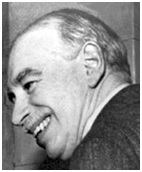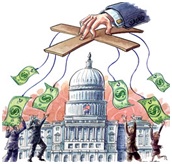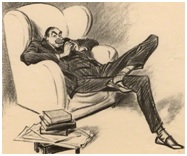|
 |
|
 |
John Maynard Keynes - Success and Wisdom
John Maynard Keynes (1883-1946)
English economist (pictured right)
His most famous book is... The General Theory of Employment, Interest and Money (1936).
Why was he successful and wise?
1. Revolutionary
His General Theory revolutionized economics by emphasizing: a) governments should increase their spending more than taxes (to increase production and income and cut unemployment) Keynes summed up his economic policy as “cheap money, wise spending” - low interest rates coupled with government spending that increases production and employment.
b) the “multiplier effect” This explains why an increase in government spending will eventually lead to a much bigger increase in income, spending and production. For example: If the government builds a school, its builders and their employees will have more work and spend more money at their suppliers and in shops, giving these businesses more money. They will then spend more, giving other people and businesses more money and so on.
2. Influence His ideas (later called Keynesian economics) were enormously influential Keynes:
a) gave people hope (by saying high unemployment could be cured through more government spending on things like health, education and defence - see point 1). This was particularly important during the Great Depression in the 1930's when unemployment was very high Pictured right is a poor Depression Californian family.
b) influenced Franklin D.
Roosevelt’s (pictured right below) New Deal policies (to reduce unemployment in America during the Great Depression).
c) helped devise the Bretton Woods agreement in 1944 This stabilized the world economy by setting up the World Bank and the International Monetary Fund (IMF) to help countries in financial difficulties.
3. Foresight In another influential book, The Economic Consequences of the Peace (1919), he attacked the huge war reparations that Germany had to pay after its defeat in the First World War. He rightly said this would lead to:
Inflation, he wrote, is a secret way of robbing people of their wealth.
4. Intelligence and learning The philosopher, Bertrand Russell (pictured right), described Keynes as the most intelligent person he had ever met. Keynes believed that knowledge comes from:
Powerful men:
5. Principles Keynes (pictured right in David Low's portrait) believed that:
a) people come first The needs of people must come before money. He attacked the selfish greed of capitalism which he described as “the astounding belief that the most wickedest of men will do the most wickedest of things for the greatest good of everyone”.
b) everyone should love learning and life His last words were, “I should have drunk more champagne”. 6. Action now “In the long run we are all dead”, he said. So governments must act now and not think that economic problems, such as inflation and unemployment, will solve themselves.
Key quote on change If the barometer is high and the clouds are black, don’t waste time on a debate on whether to take an umbrella.
Key quote on creativity Ideas shape the course of history.
Key quote on the past, present and future I do not know which makes a man more conservative – to know nothing but the present, or nothing but the past.
Key quote on planning and strategy In the long run... we are all dead.
Key quote on economics The ideas of economists and political philosophers, both when they are right and when they are wrong, are more powerful than is commonly understood. Indeed the world is ruled by little else. The day is not far off when the economic problem will take the back seat where it belongs, and the arena of the heart and the head will be occupied or reoccupied, by our real problems — the problems of life and of human relations, of creation and behaviour and religion
Key quote on education Education: the inculcation of the incomprehensible into the indifferent by the incompetent.
Key quote on innovation The difficulty lies not in the new ideas but in escaping the old ones.
Key quote on communication Words ought to be a little wild, for they are the assault of thoughts upon the unthinking.
Key quotes on decision making When the facts change, I change my mind. There is no harm in being sometimes wrong - especially if one is promptly found out. It’s better to be roughly right than precisely wrong.
Key quote on business ethics Capitalism is the astounding belief that the wickedest of men will do the wickedest of things for the greatest good of everyone
|
|
|
||
|
|
|
||
|
||
| Copyright © wisdomtowin.com All Rights Reserved | ||
|










